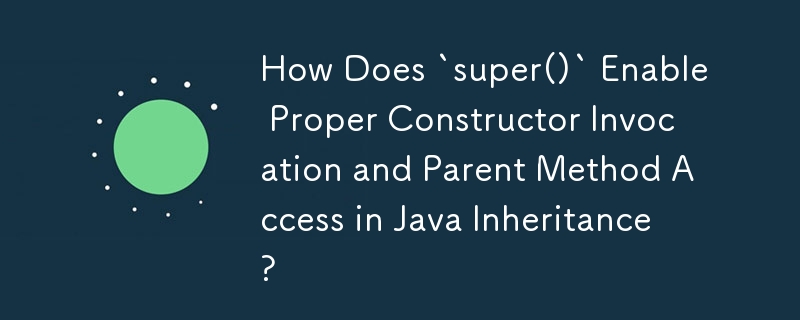

Exploring 'super()': Its Role in Java Inheritance
Java's 'super()' keyword plays a crucial role in object-oriented programming, particularly when dealing with inheritance. Let's dive into understanding its usage and capabilities.
Calling the Parent Constructor
'super()' is primarily used to invoke the parent class's constructor when creating a new subclass object. It ensures that the parent's initialization code runs before the subclass's own constructor executes.
When 'super()' is called without any arguments, it defaults to calling the parent constructor with no arguments. This is necessary to ensure proper object initialization and setup inherited state.
Example:
class Parent {
private String name;
public Parent() {
name = "Default parent name";
}
}
class Child extends Parent {
public Child() {
super(); // Calls the Parent constructor with no arguments
}
}Passing Arguments to the Parent Constructor
'super()' can also be used to pass arguments to the parent constructor. This is useful when the parent constructor has multiple overloaded methods. By specifying specific arguments, you can call the desired parent constructor.
Example:
class Parent {
private String name;
public Parent(String name) {
this.name = name;
}
}
class Child extends Parent {
public Child(String name) {
super(name); // Calls the Parent constructor with a name argument
}
}Calling Parent Methods
In addition to invoking the parent constructor, 'super' can also be used to access parent class methods and variables. This allows subclasses to extend or override inherited behavior.
To call a parent method, use the syntax 'super.methodName()'.
Example:
class Parent {
public void printName() {
System.out.println("Parent's name: " + name);
}
}
class Child extends Parent {
public void printChildName() {
super.printName(); // Calls the printName() method from the Parent class
}
}For detailed tutorials and further explanation, please refer to the provided resource link.
The above is the detailed content of How Does `super()` Enable Proper Constructor Invocation and Parent Method Access in Java Inheritance?. For more information, please follow other related articles on the PHP Chinese website!
 The difference between vscode and visual studio
The difference between vscode and visual studio
 What private information will Douyin's close friends see?
What private information will Douyin's close friends see?
 Solution to the problem that exe files cannot be opened in win10 system
Solution to the problem that exe files cannot be opened in win10 system
 Common color hexadecimal codes
Common color hexadecimal codes
 What is an .Xauthority file?
What is an .Xauthority file?
 How to change password in MySQL
How to change password in MySQL
 js method to get array length
js method to get array length
 convert command usage
convert command usage




